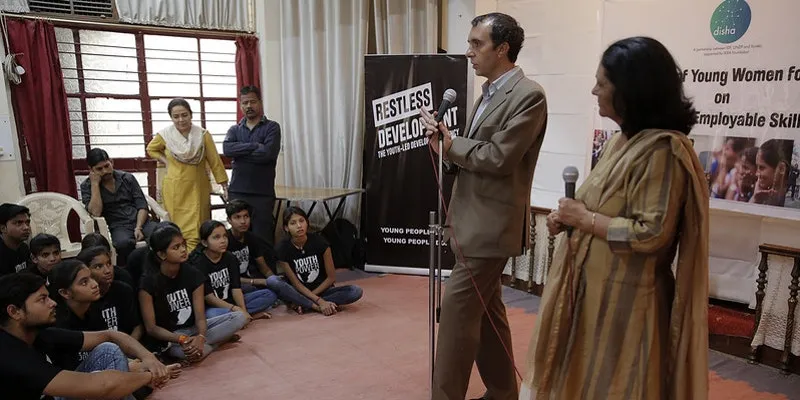UNDP India’s Project Disha is now going beyond skilling women
UNDP India’s Project Disha was started in 2015 with a focus on skilling and making women employable. Now it is also looking to skill men, and is in talks with large corporates to onboard more partners.
India has one of the largest youth populations in the world. In fact, by 2030, India will have the largest number of young people on the globe. Europe, Japan, and the US, on the other hand, will have an ageing population. This means that India has a massive opportunity to fill the resulting global deficit in skilled workforce.
But the education system in India does not prepare the youth for what they will do in their adult life, says Clement Chauvet, Chief, Skill and Development, United Nations Development Programme (UNDP) India. “Young people in India are not skilled enough to make sure that India becomes the skill capital,” he says.
It was to fill this gap that UNDP’s Project Disha was started in late 2015, with a focus on skilling and making women employable. After having skilled and helped employ over eight lakh women, Project Disha is extending its reach to include men as well.

Career counselling session for young female students underway
“Disha was restricted to girls. But in the kind of work we do, we cannot discriminate. Both men and women need skilling because in India the connect between education and work does not exist,” says Clement.
Career guidance and counselling can be the missing link between education and skills, he adds. “It is mostly non-technical graduates like BA and BCom holders that we work with,” Clement says. The project also works with government schools and provides career guidance to Class XI and XII. UNDP often links these young students with apprenticeship and vocational studies.

Clement Chauvet, Chief, Skill and Development, United Nations Development Programme (UNDP) India addressing young students.
The project is a partnership between UNDP India, IKEA Foundation, and India Development Fund. UNDP is currently looking to onboard more partners and is in talks with large corporates - both global and Indian, as well as State governments, according to Clement. Project Disha already works with the states of Telangana, Maharashtra, Haryana, and Karnataka.
Fostering entrepreneurial thinking
The Indian economy is not creating enough formal jobs, says Clement. In fact, government data shows that the unemployment rate rose to a 45-year-high of 6.1 percent in the financial year 2017-18. To address the issue of lack of jobs and to encourage entrepreneurship among young people, UNDP has recently started a programme called Youth Co:Lab.
“We want to foster a bit of this entrepreneurial thinking, organise challenges in the sustainable development framework, and ask young people to come up with financially viable ideas linked with sustainable development. There will be a contest and the winner will receive a prize of a few lakh rupees to prototype their ideas. We will mentor them and link them with potential sources of funding through angel investors, etc,” says Clement.
Employment exchange
UNDP also has YES or youth employment service centres across the states that it works with. These function like employment exchanges where young people from Tier II and III cities who do not want to migrate to bigger cities can find jobs in these regions. The project regularly undertakes outreach programmes to spread awareness among locals about its YES centres. UNDP India works directly with industry bodies such as CII and FICCI along with local associations of industries for creating jobs in the areas of retail, banking, hospitality, and others.
Project Disha works with over 2,000 employers, and has partners such as IKEA, L&T, Hero MotoCorp, GIZ (Germal Corporation for International Cooperation), Swedish Chamber of Commerce and Industry, who help fund their initiatives to skill and employ young people in India.
For the calendar year 2019, the project has a budget of Rs 20 crore.









